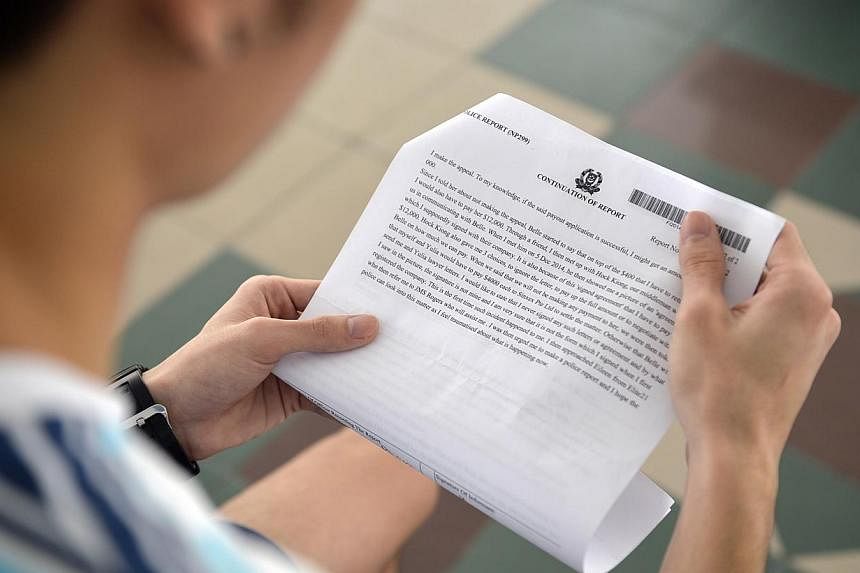Chicken rice seller S. L. Lim was approached by a man who offered to help him set up a website and an app to promote his hawker stall. In the end, Mr Lim lost $5,000 and the website never materialised.
In another instance, polytechnic student Kelvin Ong was approached by a business consultant who gave him $400 to set up an online business. Now, he has been asked to pay $12,000 to the business consultant's company.
Mr Lim and Mr Ong are among those who have fallen victim to scams that rode on the popularity of the Productivity and Innovation Credit (PIC) scheme.
Introduced in 2010, the scheme is administered by the Inland Revenue Authority of Singapore (Iras). It offers financial incentives - tax deductions or cash payouts - to firms that invest in machinery, staff training or restructuring to be more productive.
Iras received 45,000 PIC applications between February and October last year. Of these, about 10 per cent - or 4,500 - were flagged as "high risk" cases. These were identified as having traits that strongly indicated illegitimate claims, according to a Straits Times report in November. About a third of such claims were rejected while the rest were adjusted.
In the case of Mr Lim, he had hoped that a website and app would help improve his business at the newly-renovated hawker centre in Bedok North. The Mandarin-speaking, 64-year-old hawker was not aware of the PIC scheme, until a man - a Mr Adrian Soh - approached him at his stall in September and told him about it.
He agreed to let the man help him file claims under the scheme, for setting up the website, and paid him $5,000. Nothing has happened, said Mr Lim.
"Whenever I approached him for the website or the app, he would say he is busy and had not had time to work on it," Mr Lim told The Straits Times.
It is not known if the man even filed the claims with Iras in the first place.
For Mr Ong, he said he and a friend were approached in November by an agent claiming to be representing computer firm Sinxex.
Mr Ong, 20, said the agent told him a business consultant from the company would offer them $400 to set up an online business. Sinxex would then provide them with a database management system for the business selling mobile phone accessories.
The condition was that he and his friend had to claim $24,000 from the PIC scheme.
Once the claim was approved, Sinxex would get half of the $24,000 while the agent would get $3,000, said Mr Ong. He and his friend were to receive $4,500 each, which he said would have been useful in helping them set up the business.
However, their claim was rejected and Sinxex is now asking for the $12,000 due to them, said Mr Ong.
"I was shocked. The company even threatened to send me a lawyer's letter," he said, adding that he has lodged a police report.
When contacted, a spokesman for Sinxex denied that the company had given Mr Ong money to set up a business. She also denied that the firm had struck the alleged deal with Mr Ong and his friend.
"We only wanted to facilitate their claims," she said.
As at Oct 31, Iras has conducted investigations into 343 PIC claims since its launch in 2010, and has prosecuted three companies and their directors for submitting false claims.
Iras has recovered and denied cash payouts and bonuses for 150 wrongful claims, amounting to about $7.6 million, including penalties and fines, according to the newspaper report in November.
Iras also has more means to stop such abuse, after new laws were passed in Parliament on Nov 3 to introduce measures to clamp down on errant claims.
For example, businesses must now show that their IT and automation equipment are on the company's premises and indeed used for the business, before they can claim cash payouts under the scheme. Previously, they only had to show they had incurred the expenditure.
Offenders convicted of abuse may pay a penalty of up to four times the amount of the cash payout fraudulently obtained or the tax evaded, or be fined up to $50,000 and/or jailed for up to five years.
Those who promote or facilitate claims for PIC benefits for abusive arrangements can also be punished.
Iras said vendors or consultants that misrepresent the scheme with erroneous details, gross exaggeration or promotional gimmicks to sell their products or services may be liable for tax offences.
The taxman said it "will not hesitate to prosecute individuals or businesses who flout tax laws".


